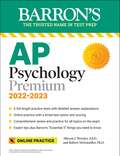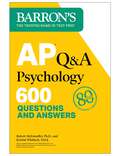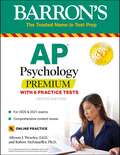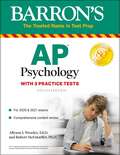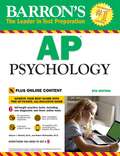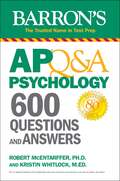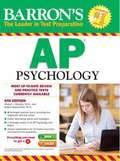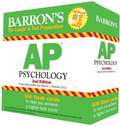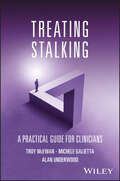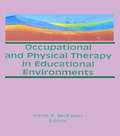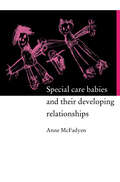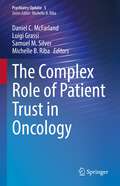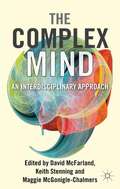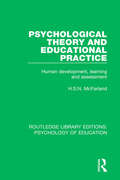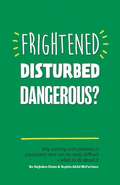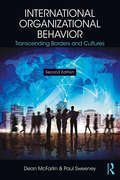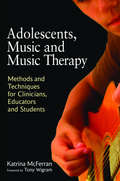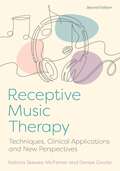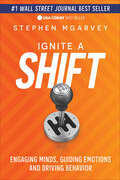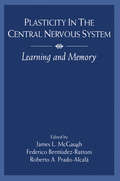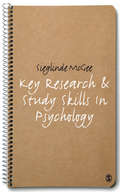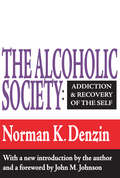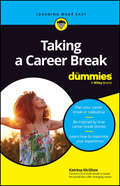- Table View
- List View
AP Psychology Premium, 2022-2023: 6 Practice Tests + Comprehensive Review + Online Practice (Barron's Test Prep)
by Robert McEntarffer Ph.D. Allyson J. Weseley Ed.D.Be prepared for exam day with Barron&’s. Trusted content from AP experts! Barron&’s AP Psychology Premium: 2022-2023 includes in-depth content review and online practice. It&’s the only book you&’ll need to be prepared for exam day.Written by Experienced Educators Learn from Barron&’s--all content is written and reviewed by AP expertsBuild your understanding with comprehensive review tailored to the most recent exam Get a leg up with tips, strategies, and study advice for exam day--it&’s like having a trusted tutor by your sideBe Confident on Exam DaySharpen your test-taking skills with 6 full-length practice tests--3 in the book, including a diagnostic test to target your studying, and 3 more onlineStrengthen your knowledge with in-depth review covering all 9 Units on the AP Psychology ExamReinforce your learning with practice questions at the end of each chapter Online PracticeContinue your practice with 3 full-length practice tests on Barron&’s Online Learning HubSimulate the exam experience with a timed test option Deepen your understanding with detailed answer explanations and expert adviceGain confidence with scoring to check your learning progress
AP Q&A Psychology, Second Edition: 600 Questions and Answers (Barron's AP)
by Robert McEntarffer Ph.D. Kristin Whitlock M.Ed.Be prepared for exam day with Barron&’s. Trusted content from AP experts!Barron&’s AP Q&A Psychology features 600 questions with answer explanations designed to sharpen your critical thinking skills, provide practice for all AP question types, and maximize your understanding of the concepts covered on the AP exam.Why Study with AP Q&A?Find questions and answers on research methods, sensation and perception, learning and cognition, developmental and abnormal psychology, treatment of psychological disorders, social psychology, and moreGet essential practice in all question types, including definition, scenario, stimulus, name recognition, and historical approaches and perspectivesMaximize your understanding of core content while honing your ability to answer test questions efficientlyFeatures comprehensive explanations that help you answer each question correctly Check out Barron&’s AP Psychology Premium for even more review, full-length practice tests, and access to Barron&’s Online Learning Hub for a timed test option and automated scoring.
AP Psychology Premium: With 6 Practice Tests (Barron's Test Prep)
by Robert McEntarffer Allyson J. Weseley Ed.D.Barron’s AP Psychology Premium is updated for the May 2020 exam and organized according to the new nine units of the AP Psychology course. Written by active AP Psychology teachers, this guide has the in-depth content review and practice you need to feel prepared for the exam. Packed with review of the course material, this premium edition features: Six full-length practice tests: three in the book and three online. A review of all AP test topics, including research methods, the biological basis of behavior, and treatment of disorders. An abnormal psychology chapter completely overhauled to reflect the latest changes to the DSM-5. Fifteen additional multiple-choice practice questions for each unit with explained answers. An analysis of the test's essay section with a sample essay.
AP Psychology: With 3 Practice Tests (Barron's Test Prep)
by Robert McEntarffer Allyson J. Weseley Ed.D. Ed.D.Barron&’s AP Psychology is updated for the May 2020 exam and organized according to the new nine units of the AP Psychology course. Written by active AP Psychology teachers, this guide has the in-depth content review and practice you need to feel prepared for the exam. Packed with review of the course material, this edition features:Three full-length practice tests in the book. A review of all AP test topics, including research methods, the biological basis of behavior, and treatment of disorders. An abnormal psychology chapter completely overhauled to reflect the latest changes to the DSM-5. Fifteen additional multiple-choice practice questions for each unit with explained answers. An analysis of the test's essay section with a sample essay.
Barron's AP Psychology, 8th edition With Bonus Online Tests: With Bonus Online Tests
by Robert McEntarffer Allyson J. Wesely, Ed.D.This updated guide offers content and test questions based on the most recent version of the AP Psychology course objectives. Our latest edition includes:Three full-length practice exams: one diagnostic test and two full-length practice testsComprehensive answer explanations for all questionsA review of all AP test topics, including research methods, the biological basis of behavior, and treatment of disordersAn abnormal psychology chapter completely overhauled to reflect the latest changes to the DSM-5Fifteen additional multiple-choice practice questions for each unit with explained answersAn analysis of the test's essay section with a sample essayBONUS ONLINE PRACTICE TESTS: Students who purchase this book will also get FREE access to three additional full-length online AP Psychology tests with all questions answered and explained. These online exams can be easily accessed by smartphone, tablet, or computer.
AP Q&A Psychology: 600 Questions and Answers (Barron's Test Prep)
by Robert McEntarffer Kristin Whitlock M.Ed.Ideal for students who want lots of practice, Barron's new AP Q&A Psychology features 600 questions with detailed answer explanations for all question types on the exam.With comprehensive explanations, students won't just learn why an answer is correct—they'll learn the rationale behind why each other answer choice is incorrect.Barron&’s AP Q&A guide is designed specifically to help students hone critical thinking skills, provide practice for all of the AP-style question types, and maximize understanding of concepts.Looking for content review in addition to practice? Try Barron's AP Psychology, which features detailed content review, expert tips, and full-length practice tests.
Barron's AP Psychology 6th Edition
by Robert Mcentarffer Allyson WeseleyThis updated manual offers detailed preparation for the AP Psychology exam and includes: Updated content and test questions based on the most recent version of the AP Psychology course objectives Three full-length exams--one diagnostic test and two full-length practice tests All test questions answered and explained A review of all AP test topics, including research methods, the biological basis of behavior, sensation and perception, states of consciousness, learning, cognition, personality, and treatment of disorders An abnormal psychology chapter completely overhauled to reflect the latest changes to the DSM Fifteen additional multiple-choice practice questions for each unit with explained answers An analysis of the test's essay section with a sample annotated essay The manual can be purchased alone or with an optional CD-ROM that presents two additional full-length practice tests with automatic scoring and fully explained answers. BONUS! An exclusive online exam included with the purchase of the book or the book with CD-ROM.
Barron's AP Psychology Flash Cards
by Robert Mcentarffer Allyson WeseleyThis set of 500 flash cards will help you understand and appropriately use psychological vocabulary terms frequently found in the multiple choice and free response sections of the AP Psychology exam. Each 4-1/2" x 2-3/4" card features: A frequently used psychology term on one side, with definitions, synonyms, explanations, and examples on the reverse side The context for the term, or the areas of psychology in which the term is most often used A punch-hole in one corner that accommodates an enclosed metal key-ring-style card holder, allowing students to arrange flash cards in any sequence Cards are organized by topic, including: History, Methods, Biology, Consciousness, Cognition, Motivation, and more. A great study aid to be used alone or in tandem with Barron's AP Psychology test prep manual.
Treating Stalking: A Practical Guide for Clinicians
by Troy McEwan Michele Galietta Alan UnderwoodTREATING STALKING Understand and address the drivers of stalking behaviour with this vital guide In the thirty-five years since stalking was identified as harmful behaviour, addressing its social effects has largely fallen to criminal justice systems. There is, however, significant evidence to suggest that pure criminalisation has limited meaningful impact. Mental health and other interventions for people who stalk may be the only serious path to relief for many stalking victims. Despite this, robust research into treatment for people who stalk remains rare, and relevant resources for treatment providers few. Treating Stalking is the first comprehensive guide for clinicians on this vital subject. It outlines 10 principles of effective intervention and gives detailed, practical, advice about delivering psychological and other treatment. It’s content draws on decades of research and clinical experience, but Treating Stalking also proposes a stalking research agenda to help ensure that future practice is evidence-based. Treating Stalking readers will also find: Case examples and worksheets from the authors’ psychological practice Detailed advice on assessment, risk assessment, case formulation, and ethical and legal issues Discussion of multidisciplinary and multiagency management to help stop stalking Treating Stalking is a must-have for any psychologist or other mental health professional looking to treat patients who stalk.
Occupational and Physical Therapy in Educational Environments
by Irene McewenOccupational and Physical Therapy in Educational Environments covers the major issues involved in providing lawful, team-oriented, and effective occupational and physical therapy services for students with disabilities in public schools. For those involved with students with disabilities, this book helps them make sound decisions about services that will make a meaningful difference in the lives of these children.Since the 1975 enactment of Public Law 94--142, which mandated that occupational and physical therapy be provided “as may be required by a handicapped child to benefit from special education,” this required link between therapy and education has continued to lead to confusion and controversy about which students should receive therapy in school and what types of services should be provided. The purpose of Occupational and Physical Therapy in Educational Environments is to clarify the major issues surrounding occupational and physical therapy in public schools, and to provide a framework for delivery of team- and family-oriented services that meet individual needs of students with disabilities.For those unsure of current regulations regarding handicapped students, or those who need clarification on the law, the book begins with a review of legislation and regulations. This begins to guide and shape schools’provision of therapy services. The following chapters assist occupational and physical therapists and important members of the educational teams of disabled students to make sound decisions about which students need school-based therapy services: Laws that Shape Therapy Services in Educational Environments: summarizes the major statutory law, federal regulations, and case law interpretation in which school-based practice is grounded. Pediatric Therapy in the 1990s: reviews contemporary theories of motor development, motor control, and motor learning that have had major impact on therapy for school-age children with disabilities. Related Services Decision-Making: describes a strong team approach to determining a student’s need for occupational and physical therapy services, which takes into account the unique characteristics of both the student and the educational team. Assessment and Intervention in School-Based Practice: describes an approach to assessment and intervention in schools that clearly illustrates a relationship between therapy and educational programs that result in meaningful outcomes for students. Challenges of Interagency Collaboration: reports on a qualitative study that points out that schools are not the only settings in which many students with disabilities receive services, so coordination between various agencies is essential to avoid gaps, overlaps, and cross purposes.Those who can benefit from Occupational and Physical Therapy in Educational Environments include occupational and physical therapists who work in public schools, school administrators, teachers, and even parents of disabled children.
Special Care Babies and their Developing Relationships
by Dr Anne McfadyenSpecial care babies are at the centre of a complex system of relationships involving both family members and professionals. Prematurity, disability and life-threatening situations create a crisis which is likely to have a different meaning for each participant. Each baby's developing relationships will both influence and be influenced by relationships within the hospital and the family system. Special Care Babies and their Developing Relationships puts professionals in touch with how babies, their parents and the staff who care for them actually experience neonatal care. The book explores institutional, cultural and family beliefs about prematurity and considers the differences in beliefs and in needs of parents and staff. Anne McFadyen argues that to support the key mother-child relationship, these differences must be acknowledged, as they are at the heart of the relationship between two crucial systems which have the power to influence the baby's survival and the rest of his or her life.
The Complex Role of Patient Trust in Oncology (Psychiatry Update #5)
by Daniel C. McFarland Luigi Grassi Samuel M. Silver Michelle B. RibaThis book presents a comprehensive portrait of trust in medicine and oncology. Trust is vital to medical care. It is linked to treatment recommendation adherence, continuity of care, and even treatment efficacy under certain scenarios, and is distinct from other commonly measured patient-reported outcomes that are used to drive medical practice, such as patient satisfaction. Cancer care highlights many of the issues with trust that all clinicians confront and brings to light the interplay of technology, rapidly advancing treatments, and readily available information consumed by patients and families that may complicate clinician-patient communication.Each chapter highlights a different aspect of trust in the medical setting, many of which are specific to oncology. For example, trust is fundamental to the first encounter with an oncologist. The anatomy of that encounter is explored. The elements of trust are investigated, from the institutional or fiduciary perspective to the nuances of the personal and individual encounters with patients. Several key factors are relevant to trust within these encounters, such as the patient’s background, attachment style, and perception of ethically responsible commitment. Further chapters cover topics like the proliferation of false information, health inequities, and patient-centered care.The Complex Role of Patient Trust in Oncology will be of great interest to oncologists, psychiatrists, internists, and any healthcare professional interested in the role of trust in patient care.
The Biological Bases of Economic Behaviour: A Concise Introduction
by David McFarlandHuman genetics has changed little over the past 20,000 years, but human economic behaviour has changed a lot. These changes are probably due to human cultural evolution. But studies of human hunter-gatherers, and of a variety of other animal species, show that their micro-economic behaviour is much the same. Whereas the standard economic analysis focuses on money, the biological approach brings time and energy into the analysis. Moreover, humans and other animals tested under laboratory conditions do not exhibit the complexity of the results of field studies. In other words, results obtained in the real world are not the same as those obtained in the laboratory. <P><P> The Biological Bases of Economic Behaviour invites readers to approach micro-economics from a biological viewpoint, in a clear and introductory manner.
The Complex Mind
by David Mcfarland Keith Stenning Maggie Mcgonigle-ChalmersCombining the study of animal minds, artificial minds, and human evolution, this book examine the advances made by comparative psychologists in explaining the intelligent behaviour of primates,the design of artificial autonomous systems and the cognitive products of language evolution.
Psychological Theory and Educational Practice: Human Development, Learning and Assessment (Routledge Library Editions: Psychology of Education)
by H.S.N. McFarlandOriginally published in 1971, this book was a critical introduction to the psychology of human development, learning and assessment. It was written with special attention to the needs of students of education and teachers, keeping in view the practical implications of psychological evidence. The author’s purpose was to provide a clear and straightforward account of these matters, while at the same time promoting a thoughtful and critical response. If the book is to be called a textbook, it is so in this best sense.
Frightened, Disturbed, Dangerous?: Why working with patients in psychiatric care can be really difficult, and what to do about it
by Sophie Abild Mcfarlane Bo Hejlskov ElvénPatients in psychiatric care can behave in ways that can be alarming for staff, and difficult to respond to. The authors of this practical and imaginative book explain why patients may behave in these ways, and offer a toolkit of ways to respond effectively and kindly. With many everyday examples of how to keep the space positive and safe, and patients calm, this book could transform your working life.
International Organizational Behavior: Transcending Borders and Cultures
by Dean McFarlin Paul SweeneyThis book focuses on understanding and managing organizational behavior in an international context, considering the conceptual framework of culture and offering practical advice for navigating cultures in the workplace. Readers will gain new tools to interpret behavior, helping them to manage international challenges effectively. The authors outline the critical management and adaptation skills necessary to develop within a globalized organization, teaching the reader how to recruit, coordinate, and evaluate an international team. Updated "Culture Clash" and "Global Innovations" boxes provide important insights into identifying a core set of values to "customize" management techniques across cultures, focusing particularly on growing countries like India and China. The new edition features a more streamlined chapter structure, updated discussion questions, and new end-of-chapter cases with self-scoring quizzes for further development. International Organizational Behavior will prove a valuable resource for any student of organizational behavior, international management, and international business. A companion website provides additional support for instructors, featuring an instructor’s manual, test bank, and PowerPoint slides.
Adolescents, Music and Music Therapy
by Katrina McferranWhen guided effectively, the relationship between adolescents and music can offer powerful opportunities for expression and release. This book provides music therapists with the complete 'how to' of working with teenage clients. Helpful and accessible, the book explains the methodology used in music therapy, a topic that has been considered only briefly until now. The author presents an empowering approach to practice, discussing how the therapist can be placed in a collaborative relationship with the individual or with the group. A range of strategies is explored, including song sharing, improvisation, song writing and various multi-media approaches. Some of the key challenges faced by music therapists working with adolescent clients are addressed, including the constantly changing repertoire and evolving musical tastes, and the author offers practical solutions for overcoming these. Contemporary models of Community Music Therapy are outlined in the second half of the book, and case vignettes illustrate how each of the methods can be applied in practice, and the outcomes that may be expected. The first of its kind, this comprehensive book is a must for all music therapists working with adolescent clients.
Receptive Music Therapy, 2nd Edition: Techniques, Clinical Applications and New Perspectives
by Katrina McFerran Denise GrockeThe second edition of Receptive Music Therapy builds on the foundations of the first but provides a completely new rendition, replete with examples from contemporary practices and recognising the value of online music therapy experiences.Learn how music therapists select music from a wide range of diverse musical styles through both collaborative decision making and client-led approaches. Methods include focused music listening, playlist construction, lyric analysis, relaxation, music and imagery along with fundamental principles for receptive music therapy.
A New Republic of Letters
by Jerome McgannA manifesto for the humanities in the digital age, A New Republic of Letters argues that the history of texts, together with the methods by which they are preserved and made available for interpretation, are the overriding subjects of humanist study in the twenty-first century. Theory and philosophy, which have grounded the humanities for decades, no longer suffice as an intellectual framework. Jerome McGann proposes we look instead to philology--a discipline which has been out of fashion for many decades but which models the concerns of digital humanities with surprising fidelity. For centuries, books have been the best way to preserve and transmit knowledge. But as libraries and museums digitize their archives and readers abandon paperbacks for tablet computers, digital media are replacing books as the repository of cultural memory. While both the mission of the humanities and its traditional modes of scholarship and critical study are the same, the digital environment is driving disciplines to work with new tools that require major, and often very difficult, institutional changes. Now more than ever, scholars need to recover the theory and method of philological investigation if the humanities are to meet their perennial commitments. Textual and editorial scholarship, often marginalized as a narrowly technical domain, should be made a priority of humanists' attention.
Ignite a Shift: Engaging Minds, Guiding Emotions and Driving Behavior
by Stephen McGarveyIgnite a Shift is a must-have tool for leaders and persuaders looking to ignite their thinking and make tangible changes in their everyday behavior.
Plasticity in the Central Nervous System: Learning and Memory
by James L. McGaugh Federico Bermúdez-Rattoni Roberto A. Prado-AlcaláCatalyzed by the development of new neurobiological and behavioral techniques as well as new conceptual and theoretical approaches to the study of the relationship between brain and behavior, research exploring brain functions enabling learning and memory has greatly accelerated in recent years. The chapters in this book reflect current theoretical approaches to the study of brain and memory and provide new insights concerning the cellular bases of memory and the differential involvement of brain systems in different forms of memory. By presenting up-to-date summaries of research investigating brain mechanisms underlying learning and memory, these chapters help to place current findings in appropriate theoretical context, and further stimulate research inquiry attempting to understand how the brain makes memory. Divided into three sections, coverage in this volume includes: * a discussion of pharmacological approaches to the study of brain and memory; * a review of experiments using a variety of techniques, including brain lesions, brain grafting, and electrophysiological recording to investigate the role of different brain regions in learning and memory; and * an examination of molecular analyses of events associated with memory formation.
Key Research and Study Skills in Psychology
by Dr Sieglinde McgeeThis book provides students with a wide range of research and study skills necessary for achieving a successful classification on a psychology degree course. It replaces the stress and fear experienced when encountering essays, reports, statistics and exams with a sense of confidence, enthusiasm and even fun.<P><P> Sieglinde McGee presents indispensable instruction, advice and tips on note making and note taking, evaluating academic literature, writing critical essays, preparing for and doing essay and MCQ exams, understanding research methods and issues associated with conducting research, writing and presenting reports and research and also some important computer skills. Examples provided will show how to score well on assignments and exams and also the sort of approach, layout, errors, omissions or answer-style that would achieve a lower grade. Practical exercises and interactive tasks are integrated throughout to clarify key points and give the students a chance to practise on their own. <P> This is a useful resource for students taking modules in study and research skills in psychology and an essential guide for all other students studying on psychology programmes. <P> Dr Sieglinde McGee is an Associate of the School of Psychology at Trinity College, Dublin, where she taught for several years.
The Alcoholic Society: Addiction and Recovery of the Self
by Reece McGeeOffering a unique theoretical foundation to understanding the lived experience of the active alcoholic, Denzin asserts that alcoholism is a disease in which negative emotions divide the self into warring, inner factions, fueled and distorted by alcoholic intoxication. The work is solidly anchored in a long-term study of the socialization experiences that began in alcoholism treatment centers and continue in Alcoholics Anonymous recovery programs. It covers the treatment process, the restructuring of self, the alcoholic's interaction with his recovery treatment program, and the modalities of self-transcendence that result from treatment.
Taking A Career Break For Dummies
by Katrina McGheeTaking a career timeout could be the window of opportunity you’ve been looking for Taking A Career Break For Dummies shows you that a career break could be life-changing. Career breaks give us a chance to pause to identify opportunities and dreams, focus on the things we’ve been missing, and develop new skills. This book empowers you to take the leap into your next chapter. There are dozens of reasons you might want to do it, but whatever your circumstance, this friendly Dummies guide will help you value your own well-being, give yourself permission to grow and explore, and reclaim your time, your life, and your happiness. Develop your plan for taking a break from your career and for transitioning back when you’re ready Set a budget for your break, create a realistic timeline, and make it happen Access practical tools and resources to help you on your career break journey Build a positive mindset so you can enjoy your break and return to your career feeling renewedFor anyone looking for a new direction, feeling burned out, or longing to reignite that inner spark, Taking a Career Break For Dummies is a must. If you’re looking for help structuring your planned time off, you’ll also love the hands-on guidance and examples inside.
